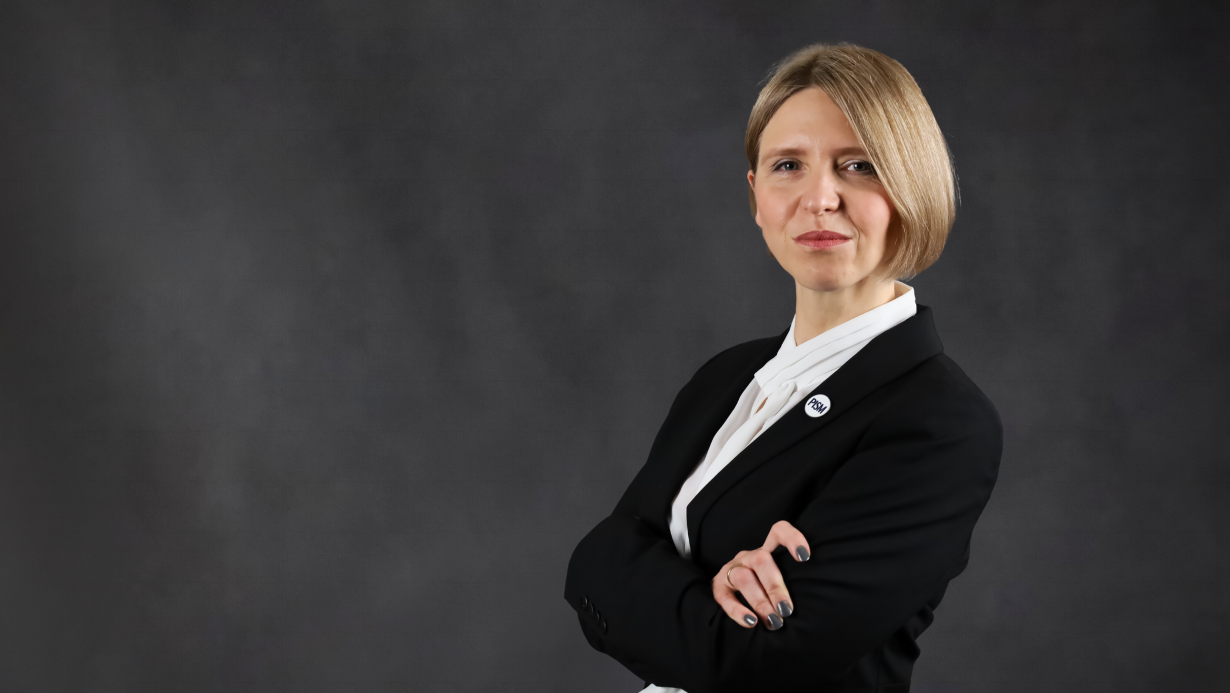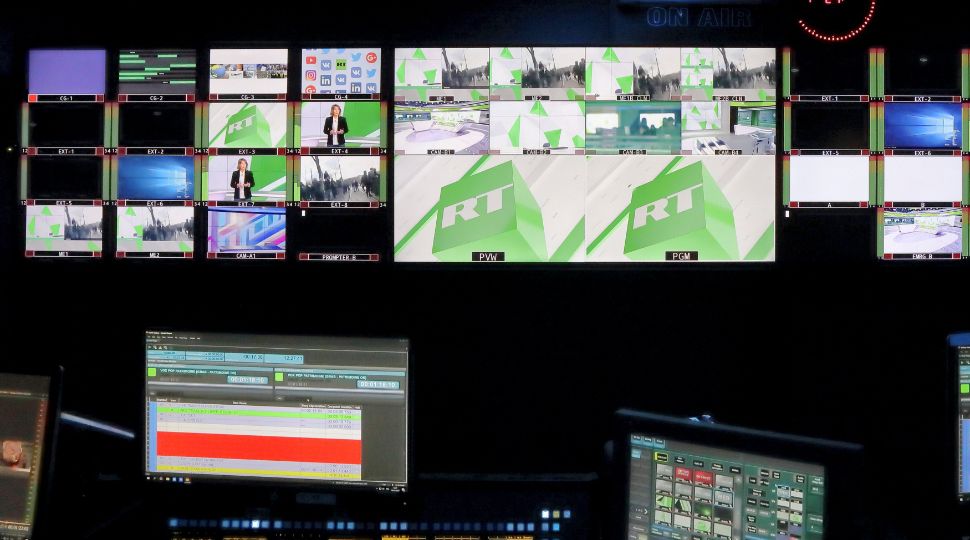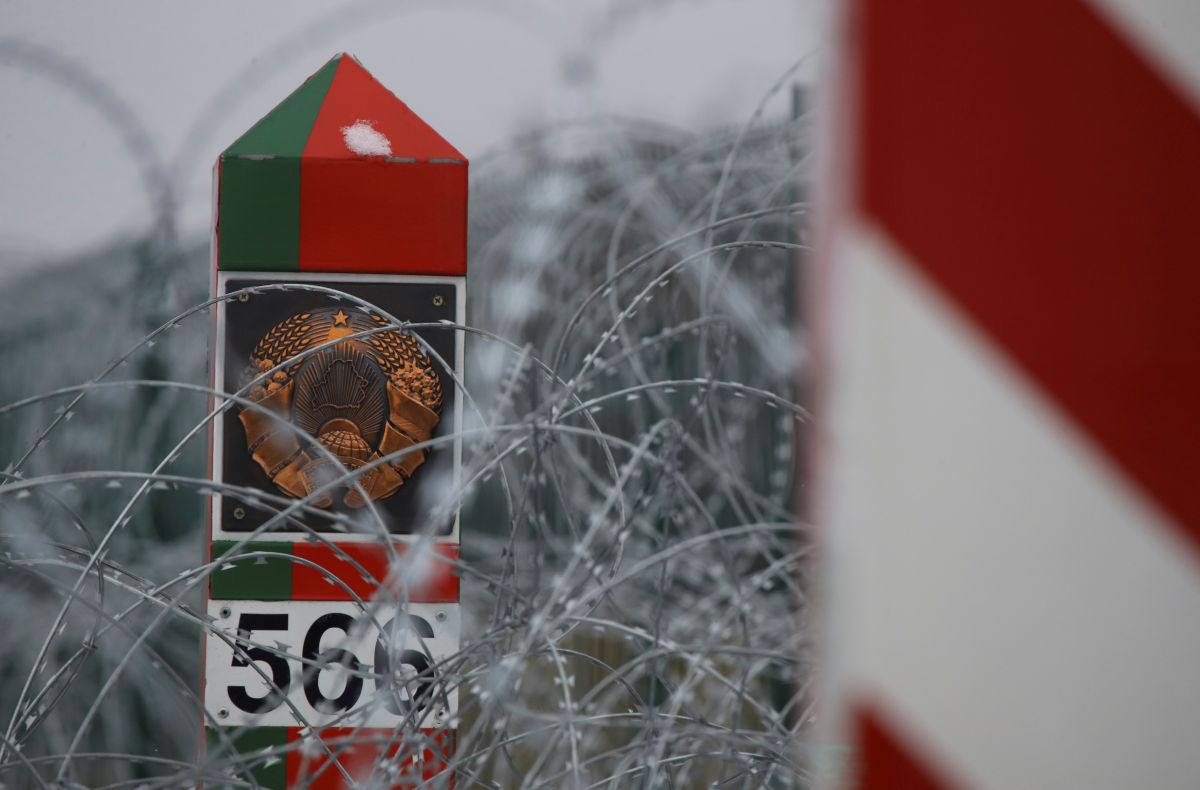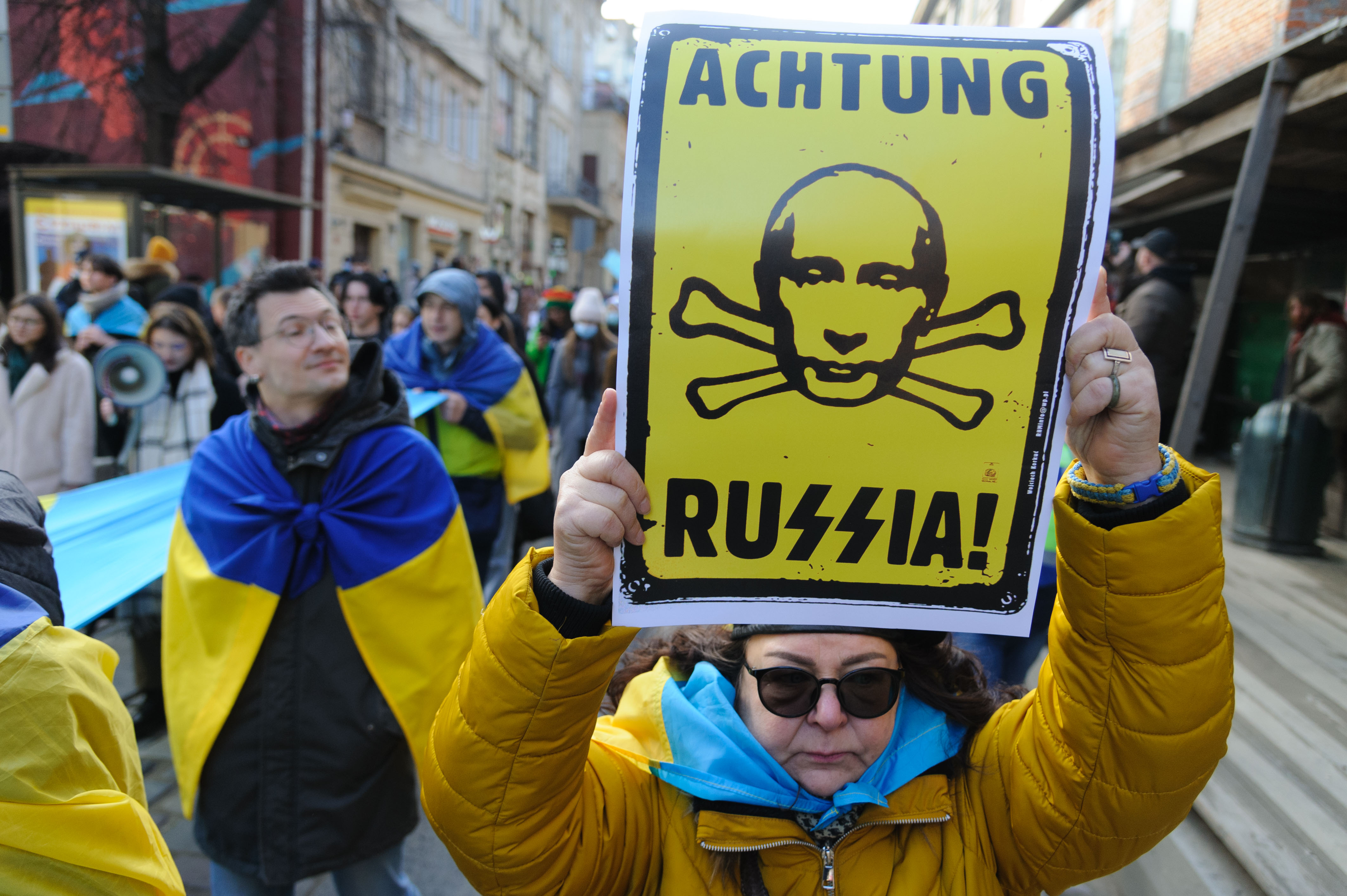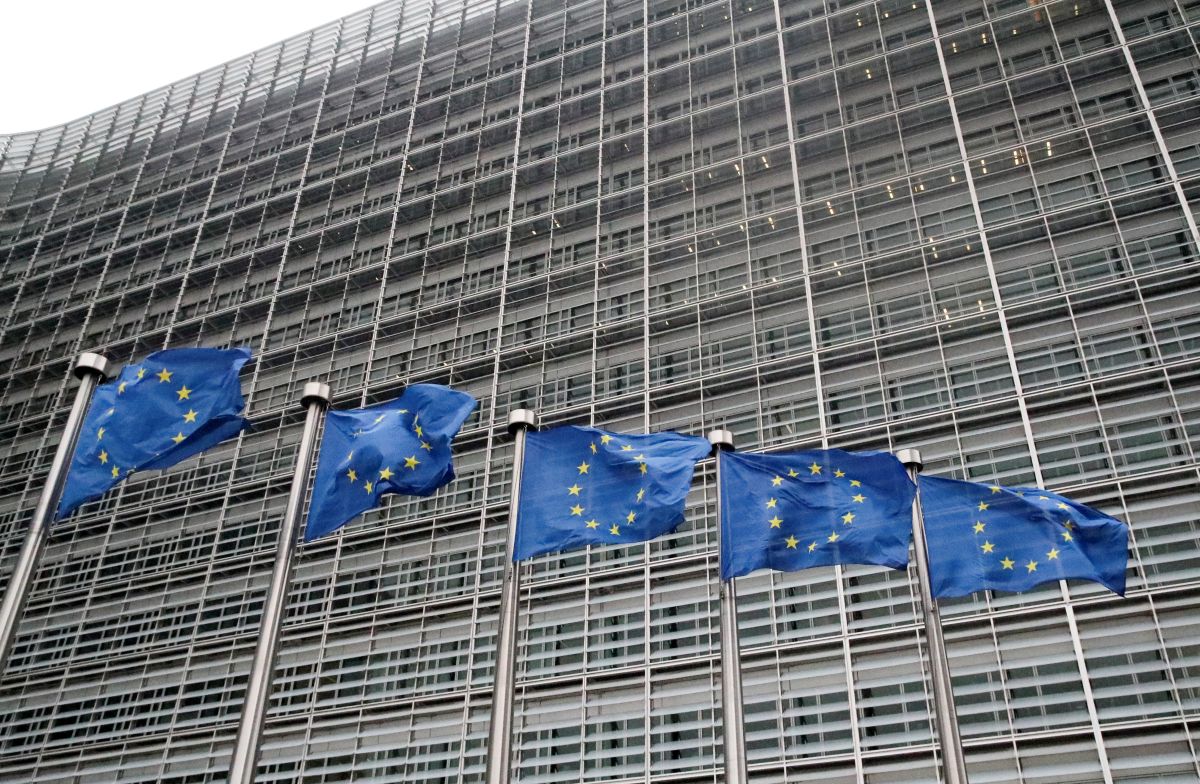Breaking Down Russian and Chinese Disinformation and Propaganda About the War in Ukraine
Russia and China use a convergent narrative about the reasons for the war in Ukraine. Both accuse the West, mainly the United States, of provoking Russia, and as a result, the indivisibility of European security has been undermined. Despite the similarities, the Chinese narrative is not entirely the same as Russia’s. China formats its messages about the war in such a way that it attempts to create the perception of it as a still-neutral partner, restraining Russia’s actions. The European Union should pay more attention to Chinese disinformation, which can more effectively reach people and groups not susceptible to Russian narratives.
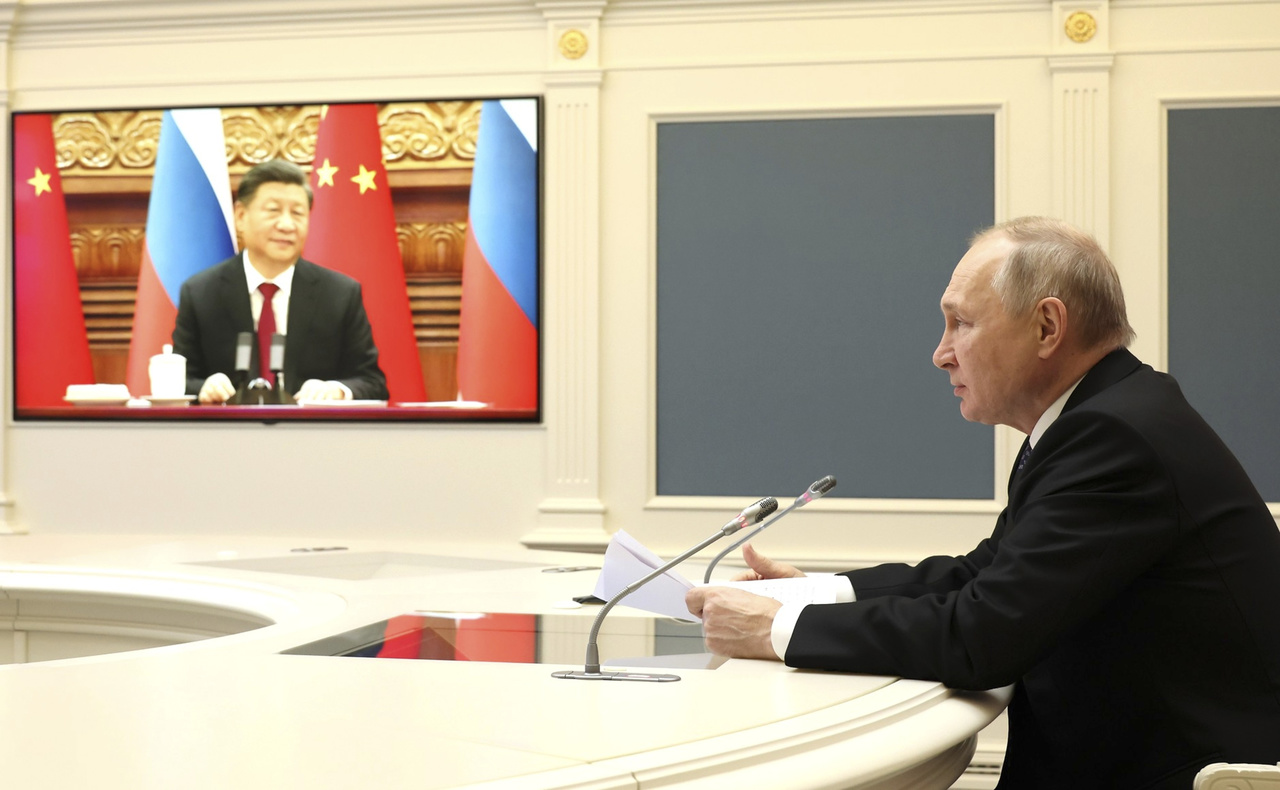 Mikhail Klimentyev/Kremlin Pool / Zuma Press / Forum
Mikhail Klimentyev/Kremlin Pool / Zuma Press / Forum
Why Russia and China Use Propaganda and Disinformation
The two countries employ propaganda, a form of persuasion, and disinformation, which is the manipulation of information and misrepresentation to achieve political goals, as part of a larger information war intended to strengthen their international position and achieve strategic goals more effectively.[1] Russia and China’s overriding aim is to weaken the West’s influence, mainly that of the U.S., and change the existing international order, with the survival of their authoritarian/totalitarian regimes at stake. Russia and China fear the very existence of a democratic superpower—the U.S.— and its like-minded partners, whose values constitute the current international order.
Russia’s aim is to convince other states to take into account its demands regarding what it calls “security guarantees” in Europe, such as its opposition to NATO’s eastward enlargement. What is more, by discrediting Ukraine, Russia hopes to weaken the political, financial, humanitarian, and military support for that country from other countries. Using manipulative techniques, Russia tries to evoke anti-Ukrainian sentiment to influence the political debate in Europe and the U.S.[2] Moreover, Russia wants to undermine the legitimacy of Western sanctions, presenting them as an unfair instrument of Western pressure on other countries, including Russia. The aim of these actions is to show Russia as a victim of “collusion” between Western countries, led by the U.S.
In the case of China, while the overarching goal of weakening U.S. influence and that of the entire West remains unchanged, the specific goals have evolved over the course of the war. Just before the Russian invasion and in the first months of the war, China’s support of Russia was motivated mainly by deterrence considerations related to strengthening China’s international position at the expense of the U.S. The conflict implied deeper U.S. entanglement in European affairs, which could result in diverting, or at least dispersing, attention away from China. The Russian invasion in the Chinese calculations was probably to be a quick operation, as Putin assumed it would be, intended to test the West’s adherence to its own commitments and values. It is plausible that China, in observing the course of the conflict and Western reaction, wanted then and still wants to draw conclusions to better prepare or buy time for a crisis in its neighbourhood, bearing in mind that China remains the most significant and long-term challenge in U.S. estimations. China likely also had hoped that divisions would be revealed between Western countries over the war, which would prove their weakness and fit in with the Chinese narrative about the West backsliding or even collapsing.
The protracted war, with a fading Russia and unwavering, strong Ukrainian resistance, propped up by unexpected generous military assistance from the West, has made China modify the few reasons why it still supports Russia. It seems that China’s endorsement has a defensive character, which means it is focusing on building resilience against what it perceives to be an increasingly hostile West. The background is the unprecedented unity of the West, including Indo-Pacific partners such as Japan (a frontrunner among Asian countries in imposing sanctions on Russia), Australia, South Korea, Taiwan, and even Singapore with regard to Ukraine. This has convinced Chinese leader Xi Jinping that an anti-Russia/anti-China bloc has formed. This is evidenced by Xi’s increasingly frequent remarks about a “division and confrontation of blocs [of countries]”[3] and that “China is facing external blackmail, containment, blockade, and extreme pressure”.[4]
The current, common goal of Russia and China is to expand their own circle of political friends through a more intensive “charm offensive”, directed towards the Global South and conducted by the two partners in parallel or jointly. At the same time, China is trying to undermine the unity of the West in order to reduce the number of countries of this anti-China bloc through “smile diplomacy”, which was launched in mid-November 2022 at the G20 summit in Bali. This approach assumes a softened rhetoric addressed to the West and combined with a new version of propaganda concerning, for example, China’s alleged distancing from Russia, as exemplified by the Chinese opposition to nuclear threats.
Russian Propaganda and Disinformation Methods
The basis of Russian policy, and consequently its propaganda, is the non-recognition of Ukraine as a state and the portrayal of Ukrainians as the objects of an international power game. As recently as 12 July 2021, Putin, in the published article “On the historical unity of Russians and Ukrainians”,[5] argued for special ties between the two nations. He wrote that Russia has historic rights to dominate Ukraine’s territory and population. Since the invasion in February 2022, the rhetoric of the Russian government and Kremlin media has included phrases such as the “Kiev regime”, “Washington’s puppets”, “fascists”, “Banderists” and, above all, “Nazis” and “neo-Nazis”, even “Satanists”, with greater intensity. This, on the one hand, is intended to dehumanise Ukrainians in the eyes of Russians, but, on the other hand, it is also to convince international public opinion that Ukraine is not an independent entity, merely an instrument of American interests in Europe used in the international competition against Russia (purportedly to build an “anti-Russia” regime on this territory).[6] One of Russia’s oft-repeated accusations is disinformation about a “betrayal of the West” related to an alleged promise not to expand NATO eastward.[7]
According to research by the EU East StratCom Task Force, there was a 290% increase in the use of the word “Nazis” and more than 500% increase in the use of the word “genocide” in Russian pro-Kremlin media between February and April 2022.[8] These terms have been used in Russian media since 2014 to describe the situation in the Ukrainian Donbas. The replication of these accusations in relation to the entire Russian-speaking population in Ukraine was aimed at convincing Russian citizens of the need to carry out military action in Ukraine by increasing the threat perception. Russian propaganda and the Russian authorities insinuated that the Americans were installing “biolabs” in Ukraine and were responsible for spreading viruses that could threaten international security. Themes about such challenges were raised by Russia at the UN Security Council in March and October 2022, among other places.[9]
Russia even manipulates the word “war” in Ukraine, calling it a “special military operation” in the Russian media space and Russian government information, thereby attempting to avoid international legal responsibility and the recognition of Russia as the aggressor. At the same time, this distinction detracts from the Russian military effort against the Ukrainians in Russian eyes. Using the word “war” in Russia is considered discrediting the Russian army and can result in a sentence of up to 15 years in prison. Pro-Kremlin propaganda portrays the Russian army’s failures as Russia fighting in Ukraine not against the Ukrainian army, but against “the whole of NATO”. This is accompanied by censorship and an information blockade imposed by the government. Journalists in Russia are supposed to report on the war in Ukraine only from official sources, and deviations from this are penalised.[10] In addition, the authorities have banned Instagram, Twitter, and other social media and websites (except YouTube for now). Most independent media outlets have been closed or have left the Russian Federation.
Part of the Russian information war is to undermine the credibility of Western media. The Russian government and its propaganda reject accusations of Russian crimes committed in Ukraine.[11] The Russian Foreign Ministry regularly blames Western media for spreading “fake news”. Former President Dmitry Medvedev, meanwhile, has accused Ukrainians of killing their own civilians to enhance anti-Russian sentiment.[12]
At the same time, Russia has had to adapt to new restrictions in the international information space. In March 2022, the EU blocked Russian portals such as RT (formerly Russia Today) and Sputnik, which had been available to English, French, and Spanish-speaking audiences, among others, with their messages. In addition, YouTube blocked Russian propaganda channels, including one called “60 Minutes” and Rosiya24. In response, RT created a special “Videos in different languages” channel on Telegram, where it posted videos on Ukraine for dissemination to other social media outlets.[13]
The most common way to distribute the material was on Twitter, where RT posted its videos in 17 languages, as well as on social media sites Gettr, Gab, and TruthSocial. It also succeeded in spreading its messages through the accounts of Russian ministries and embassies. The Spanish-language RT gained the most interest on Twitter, which, among others, reached the Latin American community. In April 2022, RT en Español was the third most-shared Twitter page with Spanish-language information about Russia’s invasion of Ukraine.[14]
Troll factories such as the Internet Research Agency (ABI), remain an important tool of Russian disinformation. Trolls generate discussion on social networks and thus reinforce narratives that are favourable to the Kremlin. Research shows that Russia tailors narratives to each audience.[15] For example, Hungary is a main target of troll activity in the EU. Arguments challenging the Ukrainian borders, pointing to Russia’s claimed right to administer the occupied territories, and suggesting that the political elite is dominated by people of American origin are all present on social media there. The narrative argues that the U.S. and NATO are to blame for the conflict in Ukraine and that their influence is present in other EU countries. In Germany, additionally, trolls capitalise on public sentiment about rising inflation and stir up discussions about sanctions by suggesting that they are more severe for the West than for Russia.[16] Both the Kremlin’s pro-government media and social media in Russia spread narratives against Ukrainian war refugees and suggest that Poland has claims on Ukrainian territory. In Poland, trolls use anti-refugee narratives and historical narratives (related to, among others, the massacre in Volhynia) in a bid to stir up anti-Ukrainian public sentiment to undermine the willingness of Poles to help Ukrainians.
China’s Disinformation and Propaganda
Chinese propaganda and disinformation[17] do not entirely overlap with the Russian. Topics about “Ukrainian Nazis” and the need to “de-Nazify Ukraine”, or blaming Ukrainians for war crimes and atrocities such as those in Bucha, are omitted by the Chinese side. The purpose is to create a belief that China is distancing itself from Russia. The way China formats this discourse is aimed to create the impression that the country is neutral and thus to convince others that it is possible to cooperate with China on a “business as usual” basis. At the same time, the way in which China officially speaks about the war indicates that it shares and supports Russia’s perspective and interests. To put it bluntly, China openly endorses Russia but formats its narrative as a trap for the collective West.
When it comes to Chinese disinformation and propaganda, narratives about three topics—Ukraine, Russia, and the West (mainly the U.S. and NATO), deserve attention. Chinese officials refer to the invasion or war using expressions like the “Ukrainian issue”, “Ukrainian crisis”, “Ukrainian conflict”, “Ukrainian dispute”, etc. There are almost no examples of Ukraine mentioned as a subject, not as an adjective. Chinese officials do not—in an explicit and unequivocal way—voice respect for the sovereignty, territorial integrity, and independence of Ukraine. Usually, when the “Ukraine issue” is mentioned, China reiterates that it “respects the sovereignty, territorial integrity, and independence of all countries”.[18] This suggests that China does not fully recognise Ukraine’s statehood because it sees it as within Russia’s sphere of influence. Moreover, Ukraine is not presented as a victim of aggression, at least not from Russia. If Ukraine is depicted as a victim, it is rather a victim of a Western—primarily a U.S.—plot to entangle the country in a game against Russia to weaken Putin. The best example of this is the Chinese narrative that the U.S. broke an alleged pledge not to expand NATO eastward (or that NATO continues to expand eastward), that this directly threatens Russia, which must defend itself.[19] In this way, China suggests that the reason for the war is the West’s efforts to join Ukraine to NATO.
The Chinese narrative about Russia is entirely different than its one about Ukraine. Russia is clearly and openly referred to as an independent and sovereign state whose concerns about its own security are justified and should be taken into account by the entire international community. As a result, China whitewashes the Russian aggression. Occasionally, China goes a step further and openly supports the Russian invasion, stating that the Chinese “understand and support Russia, as the U.S. and NATO are expanding directly on Russia’s doorstep, threatening its national security and the lives of its citizens”.[20]
Chinese officials fully replicate selected topics of Russian propaganda and disinformation. One of them is the reference to the “principle of indivisibility of security”. This new phrase in the Chinese diplomatic dictionary has been used extensively since the beginning of 2022. It is most often used when talking about Russia and the “Ukrainian question” and postulates building a new security architecture in Europe. This demonstrates that China is using the Russian understanding of the principle of the indivisibility of security enshrined in OSCE documents. The second example is the parroting of Russian disinformation about alleged U.S. laboratories in Ukraine working on biological weapons.[21]
China blames the West for stirring up humanitarian crises, including migration, food and energy shortages, and the skyrocketing prices of both, all factors detrimental especially for the Global South and Europe. The reason though is cited as the sanctions against Russia, not its aggression against Ukraine. The sanctions are framed as initiated by the U.S., which exerts pressure on others, including European states, to impose similar restrictions on the Russian Federation. The aim of this pressure is purportedly an interest in huge economic profits coming from the sanctions, benefitting the United States, which earns money from selling weapons and gas to Europe.[22]
The Chinese narrative about Russia’s threats to use nuclear weapons is also manipulative. In late 2022, China began publicly expressing opposition to such threats. However, this is not tantamount to criticising or condemning Russia. In Chinese communiqués and statements on this subject, Russia is not mentioned once. The official narrative is limited to calls for “the entire international community to stand together against the use or threat of using nuclear weapons”. The officially available comments by the Chinese on the Russian nuclear threats also appeared quite late, on 4 November 2022, during Chancellor Olaf Scholz’s visit to China. A few days earlier, the Financial Times published an article by a former colonel in the Chinese army, now an expert at Tsinghua University, who claimed that China opposes the use of nuclear weapons and will pressure Russia to stop it. At the same time, he outlined the conditions that the West should meet so that China could effectively dissuade Putin from the decision to use nuclear weapons. These conditions are in fact repeated Russian demands for the abandonment of NATO’s enlargement policy and for changes in the Alliance’s nuclear doctrine (resignation from the possibility of using nuclear weapons in response to a non-nuclear attack, so, no first use).[23]
Cooperation and Effectiveness
Russia and China not only are using a similar narrative on the causes of the war in Ukraine but also are coordinating them. In July 2021, the two countries signed a bilateral agreement on cooperation on relations and information narratives.[24] At a virtual summit held that same month, Russian and Chinese government and media representatives discussed a strategy for the exchange of news content, digital media, and co-production of television programmes.[25]
To increase the effectiveness of their propaganda and disinformation, Russia and China seek to differentiate the narratives according to the local circumstances of the region to which it is applied. Their propaganda and disinformation messages are targeted at three main audiences: the West, the Global South, and their own societies.[26] Although it is difficult to measure the effectiveness of these actions in a reliable and unquestionable way, it is possible to put forward the thesis that China’s actions are more effective in the West (mainly among some decision-makers and journalists, but not in societies already rather negatively oriented towards China[27]), while Russia’s actions in the Global South are more successful. When it comes to their own societies, their propaganda efforts are equally effective.
Since the Russian invasion of Ukraine in February 2022, Russian propaganda and disinformation have had moderate results in the West. At this stage of the war, they are not affecting the overall policy of the EU and the U.S., nor are they decreasing support for Ukraine. As recently as last May, 93% of European respondents to a Eurobarometer survey said they approved of providing humanitarian aid to those affected by the war in Ukraine, and 88% agreed that the EU should take in people fleeing Ukraine.[28] As a tool of Russian disinformation, trolls are therefore not very successful. However, they could be influencing the attitudes of individual societies, especially the Hungarian and German publics, towards, for example, protesting future sanctions on Russia. About 47% of Germans believe that sanctions hurt the EU more than Russia. Only 12% said that Russia suffers more.[29] In Poland, the use of historical (e.g., Volhynia massacre) and economic issues (e.g., allegations of special privileges for Ukrainians that Poles do not have, the burden on the education and healthcare systems) will be effective in antagonising Poles and Ukrainians.[30]
A slightly different picture emerges of the effectiveness of Chinese manipulative actions. There are still statements by European leaders who express the belief that China does not openly support Russia, takes a neutral stance, or can play the role of mediator between Russia and Ukraine. These include such voices as the head of EU diplomacy, Josep Borrell,[31] or French President Emmanuel Macron.[32] The motives behind these declarations may range from attempts to pull China away from Russia to a desire to appease their domestic business lobbies, but nevertheless the replication of Chinese arguments regarding the war in Ukraine serves to perpetuate untruths about China’s intentions.
There is also a misperception in the West that China officially and openly expresses respect for Ukraine’s sovereignty and territorial integrity and calls on other states to do the same. This is what President Macron posted on his Twitter account in November 2022 after his conversation with Xi Jinping during the G20 summit,[33] although this was not confirmed in the Chinese official readout of the meeting.[34]
Western politicians, experts, and journalists often find Chinese calls for ceasefire and peace talks credible. They are presented as a change in the Chinese narrative (although these themes have been present in the Chinese discourse since the beginning of the war), an expression of Chinese responsibility, and evidence that China is prepared to put the brakes on Russia’s actions.[35] However, these calls mainly serve Russia’s interests and ignore the will of the Ukrainians fighting for freedom and sovereignty. China does not appeal to Russia for a ceasefire (such appeals are general and unaddressed) or for a withdrawal from Ukrainian territory.
The effectiveness of Chinese disinformation is also evident in the perception that China is putting pressure on Russia over its nuclear threats. For example, articles were published in the Western press explicitly stating that China condemns Russia and Putin for threatening Ukraine with nuclear weapons.[36]
Xi Jinping’s “smile diplomacy” may also prove effective. The cordial atmosphere of Xi’s meetings with G20 leaders, including President Joe Biden, has created the impression that China is softening its narrative, thereby moving away from an aggressive foreign policy.[37] Such diplomacy, combined with Chinese criticism of nuclear threats, has convinced some of world public opinion that China is willing to stand on the right side of history. However, the Chinese communiqués, including those published last December following Xi’s meeting with Medvedev in Beijing and the Xi-Putin video conversation, show that nothing has changed in the country’s stance towards Russia and that relations between the two are “rock solid”.[38]
The effectiveness of Russian propaganda in the Global South became evident, among other places, during votes at the United Nations. Five Latin American countries—Bolivia, Cuba, El Salvador, Nicaragua and Venezuela—abstained or refused to participate in UN General Assembly votes condemning the Russian Federation for its invasion of Ukraine. Following the Bucha massacre, Mexico and Brazil abstained from voting on a resolution suspending Russia from the Human Rights Council. In May 2022, the Brazilian politician, now President Luiz Inácio “Lula” da Silva stated that Ukrainian President Volodymyr Zelensky was “as responsible as Putin for the war”.[39] In the UN General Assembly during the vote on the resolution condemning the illegal annexation of four Ukrainian oblasts, 143 countries voted in favour, Russia and four other states voted against it and 35 abstained, the majority of which were African countries, as well as China and India.[40] It is precisely towards this latter group that Russia promotes anti-Ukrainian propaganda concerning, for example, the sanctions regime, the “biolabs”, “neo-Nazis”, or blaming the food crisis on the West and Ukraine, as well as for other problems in the Global South.[41] This propaganda also emphasises that the war in Ukraine is a manifestation of Western, mainly U.S., hegemony, with Russia portrayed as a victim and representing the interests of developing countries that may find themselves in a similar situation if the U.S. or NATO decide to drag them into their next wars.
Propaganda and disinformation directed at their own societies are most effective in the case of Russia. These measures have kept support for the so-called “special military operation” above 70% (according to research by the Yuri Levada Centre). The Russian aggression against Ukraine has not turned the image of Russia in Chinese society negative. According to a survey conducted in March 2022 by the Central European Institute of Asian Studies, around 80% of respondents had a positive perception of Russia, while the U.S. is viewed negatively by 60% of respondents.[42] This may indicate that the intensive Sino-Russian political dialogue, the frequent talks and meetings between the heads of state and diplomacy, and the negative narratives about the U.S. versus the positive one about Russia are influencing the Chinese public’s perception of the Russian Federation. The success of Chinese domestic disinformation is indicated by, among other things, the belief among Chinese citizens that, due to the energy crisis, Europeans are freezing in their homes and need Chinese support. Such a narrative is used by Chinese experts and journalists citing media articles about a huge increase in exports of China-made electric blankets to Europe.[43]
Conclusions
Russia and China are carrying out an information war against the West. For China, which is increasingly making a vassal of a weakening Russia, it is essential to expand its circle of political friends in view of the deepening structural conflict with the U.S. and potential tensions in its own neighbourhood. This is why both states are exploiting resentment towards the U.S. (e.g., in connection with military interventions in various parts of the world) or towards former colonial powers from Europe. Russia and China want to convince international public opinion, especially audiences in the Global South, that external forces provoked the conflict in Ukraine, particularly the U.S., which is using it to consolidate its hegemonic position in the West, and that Russia was forced to retaliate militarily.
Although it is difficult to evaluate the effectiveness of disinformation internationally, the examples of Russian and Chinese information manipulation show that not only are the methods and content of the message important but also the attitude of the audience towards the author. In the fight against disinformation, it is therefore necessary to know the conditions and groups to which it is directed.[44] While it is difficult to influence the societies of the authoritarian Russia and China to counter this disinformation, a change of perspective is required for third countries. The colonial past of the countries of the Global South and the anti-American and anti-French attitudes of parts of societies in Africa and the Middle East create a convenient setting for Russian and Chinese disinformation. In order to counteract this, the West should first respond appropriately to historical resentments. In the West, acceptance of the theses of Chinese propaganda may be easier because of differing opinions of China and Russia (compared to Russia, China is seen as more peaceful, neutral, and cooperative), and in the context of the West’s greater and more complicated economic dependence on China than on Russia. Therefore, by realising the strategic partnership between Russia and China in confronting the West, the EU should strengthen its efforts to counter international disinformation and propaganda from these two states in particular, especially as China’s softer actions may prove more effective and more difficult to overcome in the long run.
(Annex below)
Annex:
Table: Types of Russian and Chinese Narratives on the War in Ukraine
|
Narrative |
Russia |
China (official communication) |
|
The West provokes with the threat of nuclear weapons |
+ |
+ |
|
The West violates Russia’s sphere of influence |
+ |
+ |
|
There are Nazis/fascists and Banderists in Ukraine |
+ |
– |
|
There are chemical and biological laboratories in Ukraine |
+ |
+ |
|
It is a “special military operation”, not a war |
+ |
– |
|
Genocide took place in Donbas |
+ |
– |
|
Ukraine is being used by the U.S. to compete with Russia |
+ |
+ |
|
The Americans/NATO/West are responsible for the war in Ukraine |
+ |
+ |
|
There is a need to demilitarise Ukraine |
+ |
– |
|
We are dealing with the defence of the Russian Federation |
+ |
+ |
|
The end of U.S. global dominance is approaching |
+ |
+ |
[1] The text was written in collaboration with Olga Mashtaler. See also: A. Legucka, “Russian Disinformation: Old Tactics and New Narratives,” [in:] A. Legucka, R. Kupiecki (eds.), Disinformation, Narratives and Memory Politics in Russia and Belarus, Routledge, London & New York 2022, pp. 24-29; R. Kupiecki, F. Bryjka, T. Chłoń, Dezinfomacja międzynarodowa, Wydawnictwo Naukowe Scholar, pp. 54-82.
[2] F. Bryjka, “Russian Disinformation Regarding the Attack on Ukraine,” PISM Spotlight No 15/2022, 25 February 2022, www.pism.pl.
[3] “Xi Jinping tong eluosi zongtong pujing juxing shipin huiwu [Xi Jinping’s video call with Russian President Vladimir Putin],” Chinese Foreign Ministry, 30 December 2022, www.fmprc.gov.cn.
[4] “Full text of the report to the 20th National Congress of the Communist Party of China,” Xinhua, 26 October 2022, www.news.cn.
[5] “Statja Władimira Putina «Ob Istoriczeskom Jedinstwie Russkich i Ukraincew»,” Office of the President of Russia, 12 July 2021, http://kremlin.ru.
[6] “Russia’s Strategic and Tactical Narratives in Its War against Ukraine,” Centre for Democratic Integrity (YouTube), 28 December 2022, www.youtube.com.
[7] R. Kupiecki, “‘Western Betrayal’: The Founding Myth of Russian Foreign Policy,” [in:] A. Legucka, R. Kupiecki, Disinformation …, op. cit., pp. 34-40.
[8] “Rozmowa z Martyną Bildziukiewicz – szefową unijnego zespołu ds. walki z rosyjską dezinformacją (EU East StratCom Task Force),” Sprawy Międzynarodowe No 2, 2022.
[9] https://twitter.com/JayinKyiv/status/1585969742380429314.
[10] “Dwaj Rosyjscy Żołnierze Oskarżeni O Dyskredytowanie Rosyjskiej Armii,” Rzeczpospolita, 03 September 2022, www.rp.pl.
[11] A. Legucka, “Rosjanie kłamią i dezinformują. ta część wojny wykracza daleko poza granice Ukrainy,” Nowa Europa Wschodnia, 14 April 2022.
[12] M. Domańska, “Medvedev escalates anti-Ukrainian rhetoric,” OSW Analyses, 5 May 2022.
[13] “Russian’s RT Leads A Global ‘Information Militia’ On Social Media To Bypass Censorship On Ukraine-Related Disinformation,” NISOS, October 2022, www.nisos.com.
[14] J. Brandt, V. Wirtschafter, “Working the Western Hemisphere,” December 2022, https://www.brookings.edu/wp-content/uploads/2022/12/FP_20221216_russia_propaganda_brandt_wirtschafter.pdf.
[15] “The Russia-Ukraine War In Social Media,” Political Capital, May 2022, https://Www.Politicalcapital.Hu/Pc-Admin/Source/Documents/Pc_V4_Social_Media_War_Ukraine_20220505.pdf.
[16] “The Kremlin’s Trolls Never Sleep,” Political Capital, October 2022, https://Politicalcapital.Hu/Pc-Admin/Source/Documents/Pc_Ned_Study_Kremlin_Troll_Network_2022_Web.pdf.
[17] This paper focuses on the Chinese official narrative only. It includes remarks, communiques, and readouts by the PRC chairman, ministers and deputy ministers, spokespersons of the Ministry of Foreign Affairs, etc., published on official websites and by the most important party and government media. The whole unofficial sphere, such as debates, posts, comments, published by “ordinary” Chinese people on Chinese social media, etc., has been omitted.
[18] “Wang Yi chanshu zhongfang dui dangqian wukelan wenti de wu dian lichang [Wang Yi Expounds China's Five-Point Position on the Current Ukraine Issue],” 26 February 2022, www.fmprc.gov.cn.
[19] Chinese MFA press conference, 21 March 2022, www.fmprc.gov.cn.
[20] An excerpt from a statement by Li Zhanshu, chairman of the Standing Committee of the Chinese parliament, during his visit to Moscow, September 2022, https://twitter.com/HAOHONG_CFA/status/1569864010128039936.
[21] Chinese MFA press conference, 8 March 2022, www.fmprc.gov.cn.
[22] Chinese MFA press conference, 2 December 2022, www.fmprc.gov.cn.
[23] Zhou Bo, “China can use its leverage with Russia to prevent a nuclear war,” Financial Times, 27 October 2022, www.ft.com.
[24] Protokoł czetyrnadcatoro zasiedanija Podkomissii po sotrudniczestwu w obłasti sriedsw massowoj informacyi Rossijsko-Kitajskoj Komissii po gumanitarnomu sotrudniczestwu , Ministerctwo cyfrowogo razwitija, swiazi i massowych kommunikacyj Rossijskoj Fiedieracyi, 29 July 2021 https://www.documentcloud.org.
[25] M. Hvistendahl, A. Kovalev, “Hacked Russian Files Reveal Propaganda Agreement with China,” The Intercept, 30 December 2022, https://theintercept.com.
[26] “Russia’s Strategic and Tactical Narratives …,” op. cit.
[27] L. Silver, Ch. Huang, L. Clancy, “How Global Public Opinion of China has Shifted in the Xi Era,” Pew Research Center, 28 September 2022, www.pewresearch.org.
[28] “Eurobarometer: Europeans approve of EU's response to the war in Ukraine,” European Commission, 5 May 2022, https://ec.europa.eu.
[29] E. Zalan, “Will Europeans’ support for Ukraine survive the winter?, EUObserver, 27 October 2022, https://euobserver.com.
[30] “Uchodźcy z Ukrainy: perspektywa Polski, Słowacji, Węgier i Rumunii,” Demagog, 1 April 2022, https://demagog.org.pl.
[31] “Russia’s war on Ukraine: ‘It has to be China’ as mediator, EU foreign policy chief says,” South China Morning Post, 5 March 2022, www.scmp.com.
[32] “Macron urges China to play ‘greater mediation role’ on Ukraine,” Le Monde, 16 November 2022, www.lemonde.fr.
[33] @EmmanuelMacron (Twitter), 15 November 2022, https://twitter.com/EmmanuelMacron.
[34] “Xi Jinping huijian faguo zongtong make long [Xi Jinping met with president of France Macron],” Foreign Ministry of China, 15 November 2022, www.fmprc.gov.cn.
[35] See, for example: C. Wu, “China calls for ‘ceasefire through dialogue and consultation’ in response to Russia’s announcement of a ‘partial mobilisation’,” Sky News, 22 September 2022, www.skynews.com.au; D. Strumpf, A. M. Simmons, “China’s Xi Calls for Restraint, Urges Russia-Ukraine Peace Talks,” The Wall Street Journal, 21 December 2022, www.wsj.com; N. Camut, Z. Sheftalovich, “China says it’s ‘on the side of peace’ over war in Ukraine,” Politico, 23 December 2022, www.politico.eu.
[36] See, for example: B. Pancevski, “China Rebukes Russia’s Nuclear Threats in Ukraine for First Time,” The Wall Street Journal, 4 November 2022 , www.wsj.com; K. Connolly, “China and Germany condemn Russian threat to use nuclear weapons in Ukraine,” The Guardian, 4 November 2022, www.theguardian.com.
[37]J. Kynge, Sun Yu, Xinning Liu, “Xi Jinping’s plan to reset China’s economy and win back friends,” Financial Times, 10 January 2023, www.ft.com
[38] “Wang yi: Zhong e guanxi jian ru panshi [Wang Yi: relacje chińsko-rosyjskie twarde jak skała],” 25 December 2022, Foreign Ministry of China, www.fmprc.gov.cn.
[39] C. Nugent, S. Paulo, “Lula Talks to TIME About Ukraine, Bolsonaro, and Brazil’s Fragile Democracy,” Time, 4 May 2022, https://time.com.
[40] “Ukraine: UN General Assembly demands Russia reverse course on ‘attempted illegal annexation’,” UN News, 12 October 2022, https://news.un.org.
[41] K. Wójcicka, “Czerep: Moskwa chce zagłodzić Afrykę jak Ukrainę w latach 30,” Gazeta Prawna, 29 June 2022, www.gazetaprawna.pl.
[42] R.Q. Turcsányi, K. Dubravčíkova, et al., “Chinese views of the world at the time of the Russia-Ukraine war,” Palacky University Press, CEIAS 2022, https://ceias.eu.
[43] “Dianre tan zai ouzhou you duo huo? Jinnian 1 yue-7 yue chukou e zeng su da 97% [Data analysis: How popular/desirable are electric blankets in Europe? From January to July this year, the value of exports increased by 97%],” 29 October 2022, https://finance.sina.com.cn.
[44] See: J. Czerep, S. Nowacka, “Fertile Ground: How Africa and the Arab World Found Common Language with Russia on Ukraine,” PISM Report, January 2023.


